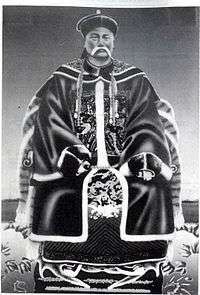Đèo Văn Trị


Đèo Văn Trị (1849 – 1908 in Lai Châu) also known as Cam Oum in Lao, was the White Tai leader at Muang Lay in the Sip Song Chau Tai or Federation of the Twelve Tai states, of the Tai Dam people.[1][2][3] He was succeeded by his son Đèo Văn Long.
In his early life Đèo Văn Trị had studied as a monk at Wat Xieng Thong temple in Luang Phrabang. In 1887 during the Haw wars when his brothers were captured and held prisoner by the Siamese, Đèo Văn Trị's Dai soldiers together with Chinese Black Flag Army soldiers, sacked Luang Phrabang.[4] Auguste Pavie prevented the capture of the ailing local ruler Oun Kham and had him taken to safety but Đèo Văn Trị captured the local uparat prince Souvanna Phomma and executed him on June 8, 1887. Đèo Văn Trị used the temple as his headquarters, along with Wat Suwannaphumaham, sparing them any damage. Pavie allied with Đèo Văn Trị and France recognised him as leader of Sip Song Chau Tai in 1890.[5]
References
- ↑ The Rebel Den of Nùng Trí Cao: Loyalty and Identity Along the ... - Page 169 James Anderson - 2007 ... French soon scored an important local victory when Auguste Pavie cultivated a personal relationship with the powerful leader of Sip Song Chau Tai (in northwestern Vietnam), Deo Van Tri (1849-1908) (also known as Kam Oum in Laotian), ..."
- ↑ Jehan Laurent Gheerbrandt Pavie, le grand humain de l'Indochine Page 73 1949 "Causerie cordiale où les soldats racontent leur engagement avec Kam Oun, Deo Van Tri de son nom annamite, un vaillant qu'ils admirent et regrettent d'avoir eu pour adversaire."
- ↑ Grand Larousse encyclopédique - Volume 1 - Page 929 1960 "DEO-VAN-TRI, en laotien Kan Oum, féodal et guerrier indochinois (v. 1849 - Lai- Châu 1908). Il succéda à son père comme chef héréditaire de Muong-Lai, sur la rivière Noire. En 1884, fonctionnaire de l'empire d'Aonam, il prit part à la guerre ."
- ↑ Textiles of the Daic peoples of Vietnam - Page 75 Michael C. Howard, Kim Be Howard - 2002 "In some instances local Thai allied themselves with these bandits and in others Chinese bandits ruled muang. Among the local Thai who joined with the bandits was the White Tai ruler of Muang Lay, Cam Oum (known in Vietnamese as Deo)"
- ↑ Where China Meets Southeast Asia: Social & Cultural Change in the ... - Page 107 Grant Evans, Christopher Hutton, Khun Eng Kuah - 2000 "A major figure with whom the early French administration allied was the White Tai leader Deo Van Tri, who died in 1909. ... of Auguste Pavie, who in return made him the official and fully fledged leader of the Sip Song Chau Tai in 1890."